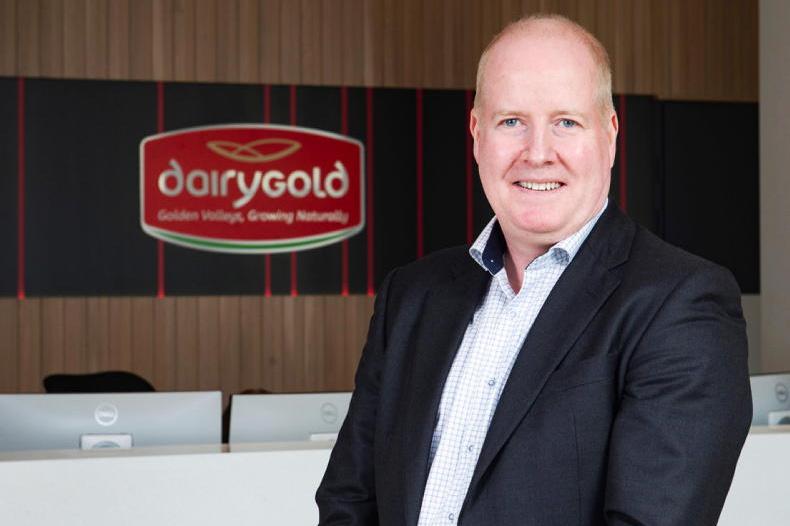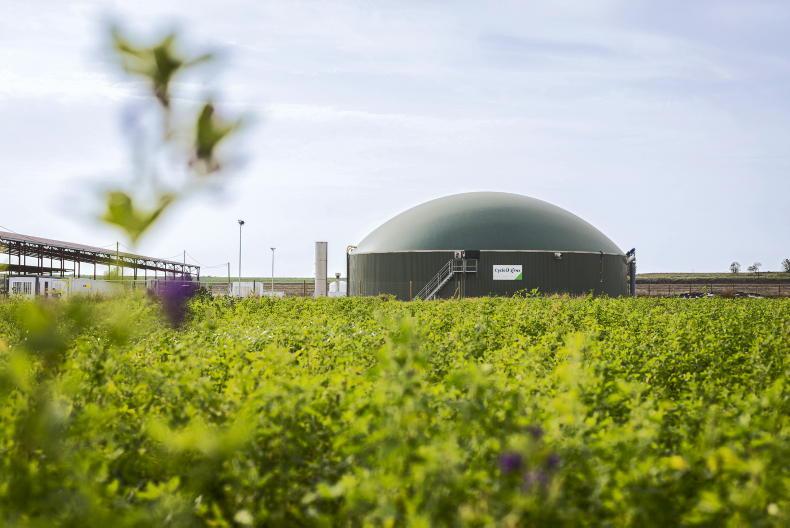There were a few common themes across all of the annual reports from the main dairy co-ops for 2023. Almost without exception, they described last year as “challenging”, as they had to deal with volatile global dairy prices, uncertain demand and the first fall in domestic milk supplies since 2012.
There was also almost complete agreement among co-op leaders that the era of capacity expansion is firmly behind us. Comments on the issue ranged from expressing satisfaction with current levels of investment, to musing on whether Ireland’s dairy processors should have built so much extra capacity in recent years and even a prediction that there would be fewer processors in the country in the coming years.
Supply
Every processor said that supply was back substantially so far in 2024, as a direct result of the terrible weather. Latest data from the CSO shows that domestic milk intake by processors was 8% lower in the first three months of the year when compared to 2023 (see Figure 1), bringing it back to levels last seen in 2020. There was also a drop in protein levels from milk suppliers, as cows were generally unable to get out to grass in the wet period. Several processors announced additional supports in March milk payments to help farmers through the difficult period. While there was hope that the rest of the year would perform substantially better on supply, no co-op CEO predicted they would see an increase in milk supply for 2024 as a whole.
Nobody was willing to put their neck on the block when it came to the outlook for milk prices. The consensus was that while global demand is expected to continue to expand, there will need to be more of a fall-off in global milk suppliers for any meaningful recovery in the dairy market.
Any talk about the future was dominated by the negative effect any change in the nitrates derogation would have. With processors’ minds already focused on the reversal in the decade-long trend in growing milk deliveries, the risk of further constraints on farm output has the potential to be disastrous for the sector.
As one co-op CEO put it, a loss of the derogation would lead to “a complete re-evaluation” of operations.
Business focus
Speaking of re-evaluation of operations, there was a notable focus among industry leaders on cost savings, adding value and diversification as co-ops seek routes for growth that no longer rely on processing ever increasing amounts of milk.
In Dairygold, we saw the purchase and integration of Vita Actives for a consideration which could eventually come close to €100m. At Tirlán, the new cheese factory built with Dutch company Royal A-Ware is up and running, while Lakeland is engaged in a streamlining of its processing facilities. Arrabawn completed the sale of its liquid milk business to Aurivo.
We have also since learned that Lakeland has established its own route to the US butter market in a tie-up with Vital Farms, a food supplier to the premium end of the consumer markets there.
Speaking of US butter, one co-op we spoke in recent weeks which expressed confidence in the outlook for supply was Ornua.
The producer of Kerrygold said that its products would always get supplies from Irish processors, as they gave the best return for the member co-ops.
The Irish dairy-processing sector did have a challenging year last year, and so far in 2024 there has been no let-up in the difficulties in making money from milk processing.
In many ways, what we are seeing from the co-ops is a reflection of a fairly normal business cycle, where the an industry goes through expansion and then consolidation phases.
However, there are also fairly fundamental differences between what has happened Irish dairy and what we see in such cycles elsewhere. Often they are driven by a new innovation or significant changes in consumer behaviour. In the case of Irish dairy processors, the driver for the expansion was a regulatory change – the ending of milk quotas.
Quotas placed an arbitrary cap on milk production in Ireland, which in turn placed a cap on processor capacity. The ending of quotas was the catalyst for an almost decade-long expansion of capacity in the industry.
It is important to understand that the long period of quota restrictions meant that processors had a lot of space for expansion. Quotas were a non-market mechanism which put a cap on expansion, so their ending meant a lot of growth could happen before market forces would take over again. To be clear, never-ending expansion is impossible, so the consolidation period was always going to arrive. The rebound of an once-artificially-repressed industry in the post-quota world just meant that its arrival has been considerably delayed.
Across the sector we can now see that consolidation in progress within processors. It remains to be seen when we will see it happening in the sector as a whole. Whether that comes through mergers and acquisitions, or whether it happens through a slower – and messier – process of attrition, where the weaker processors are allowed to fail and the few remaining take up their milk supply, remains to be seen.
However, there is another non-market force at play which could accelerate that process further and that is the future of the nitrates derogation. A further cut there would, to quote one co-op CEO, “pull the rug out from under” the industry.
Like the end of the quotas allowed for a rapid and substantial acceleration of processing in Ireland, a cut in the derogation would rapidly accelerate the consolidation process that is already underway. That rapid acceleration would increase the risks of the consolidation process becoming messy, leading to increased uncertainty at both farm and processor level.
In short
Trading conditions remain challenging.Derogation decision is key for processors’ future. Co-op focus on “adding value”.Kerrygold remains bright spot.
There were a few common themes across all of the annual reports from the main dairy co-ops for 2023. Almost without exception, they described last year as “challenging”, as they had to deal with volatile global dairy prices, uncertain demand and the first fall in domestic milk supplies since 2012.
There was also almost complete agreement among co-op leaders that the era of capacity expansion is firmly behind us. Comments on the issue ranged from expressing satisfaction with current levels of investment, to musing on whether Ireland’s dairy processors should have built so much extra capacity in recent years and even a prediction that there would be fewer processors in the country in the coming years.
Supply
Every processor said that supply was back substantially so far in 2024, as a direct result of the terrible weather. Latest data from the CSO shows that domestic milk intake by processors was 8% lower in the first three months of the year when compared to 2023 (see Figure 1), bringing it back to levels last seen in 2020. There was also a drop in protein levels from milk suppliers, as cows were generally unable to get out to grass in the wet period. Several processors announced additional supports in March milk payments to help farmers through the difficult period. While there was hope that the rest of the year would perform substantially better on supply, no co-op CEO predicted they would see an increase in milk supply for 2024 as a whole.
Nobody was willing to put their neck on the block when it came to the outlook for milk prices. The consensus was that while global demand is expected to continue to expand, there will need to be more of a fall-off in global milk suppliers for any meaningful recovery in the dairy market.
Any talk about the future was dominated by the negative effect any change in the nitrates derogation would have. With processors’ minds already focused on the reversal in the decade-long trend in growing milk deliveries, the risk of further constraints on farm output has the potential to be disastrous for the sector.
As one co-op CEO put it, a loss of the derogation would lead to “a complete re-evaluation” of operations.
Business focus
Speaking of re-evaluation of operations, there was a notable focus among industry leaders on cost savings, adding value and diversification as co-ops seek routes for growth that no longer rely on processing ever increasing amounts of milk.
In Dairygold, we saw the purchase and integration of Vita Actives for a consideration which could eventually come close to €100m. At Tirlán, the new cheese factory built with Dutch company Royal A-Ware is up and running, while Lakeland is engaged in a streamlining of its processing facilities. Arrabawn completed the sale of its liquid milk business to Aurivo.
We have also since learned that Lakeland has established its own route to the US butter market in a tie-up with Vital Farms, a food supplier to the premium end of the consumer markets there.
Speaking of US butter, one co-op we spoke in recent weeks which expressed confidence in the outlook for supply was Ornua.
The producer of Kerrygold said that its products would always get supplies from Irish processors, as they gave the best return for the member co-ops.
The Irish dairy-processing sector did have a challenging year last year, and so far in 2024 there has been no let-up in the difficulties in making money from milk processing.
In many ways, what we are seeing from the co-ops is a reflection of a fairly normal business cycle, where the an industry goes through expansion and then consolidation phases.
However, there are also fairly fundamental differences between what has happened Irish dairy and what we see in such cycles elsewhere. Often they are driven by a new innovation or significant changes in consumer behaviour. In the case of Irish dairy processors, the driver for the expansion was a regulatory change – the ending of milk quotas.
Quotas placed an arbitrary cap on milk production in Ireland, which in turn placed a cap on processor capacity. The ending of quotas was the catalyst for an almost decade-long expansion of capacity in the industry.
It is important to understand that the long period of quota restrictions meant that processors had a lot of space for expansion. Quotas were a non-market mechanism which put a cap on expansion, so their ending meant a lot of growth could happen before market forces would take over again. To be clear, never-ending expansion is impossible, so the consolidation period was always going to arrive. The rebound of an once-artificially-repressed industry in the post-quota world just meant that its arrival has been considerably delayed.
Across the sector we can now see that consolidation in progress within processors. It remains to be seen when we will see it happening in the sector as a whole. Whether that comes through mergers and acquisitions, or whether it happens through a slower – and messier – process of attrition, where the weaker processors are allowed to fail and the few remaining take up their milk supply, remains to be seen.
However, there is another non-market force at play which could accelerate that process further and that is the future of the nitrates derogation. A further cut there would, to quote one co-op CEO, “pull the rug out from under” the industry.
Like the end of the quotas allowed for a rapid and substantial acceleration of processing in Ireland, a cut in the derogation would rapidly accelerate the consolidation process that is already underway. That rapid acceleration would increase the risks of the consolidation process becoming messy, leading to increased uncertainty at both farm and processor level.
In short
Trading conditions remain challenging.Derogation decision is key for processors’ future. Co-op focus on “adding value”.Kerrygold remains bright spot. 








SHARING OPTIONS